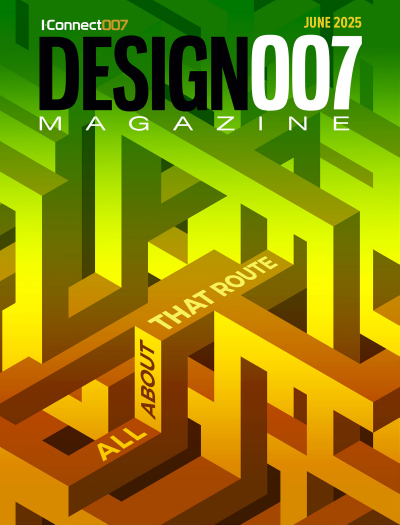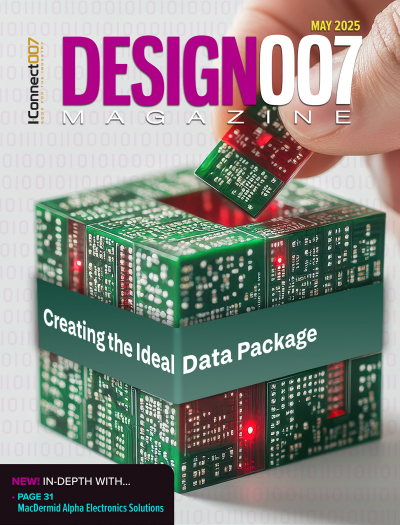-

- News
- Books
Featured Books
- design007 Magazine
Latest Issues
Current Issue
Showing Some Constraint
A strong design constraint strategy carefully balances a wide range of electrical and manufacturing trade-offs. This month, we explore the key requirements, common challenges, and best practices behind building an effective constraint strategy.

All About That Route
Most designers favor manual routing, but today's interactive autorouters may be changing designers' minds by allowing users more direct control. In this issue, our expert contributors discuss a variety of manual and autorouting strategies.

Creating the Ideal Data Package
Why is it so difficult to create the ideal data package? Many of these simple errors can be alleviated by paying attention to detail—and knowing what issues to look out for. So, this month, our experts weigh in on the best practices for creating the ideal design data package for your design.
- Articles
- Columns
- Links
- Media kit
||| MENU - design007 Magazine
Navigating the Global Materials Supply Chain: A Roundtable Discussion
December 3, 2015 | Andy Shaughnessy, I-Connect007Estimated reading time: 15 minutes
Keuthen: From our perspective as a PCB producer, we are also asked to develop new technologies, of course. That's a completely different point of view on the supply chain then from your end. We are flex-rigid specialists and pioneers in this business from using flex-rigid. For more than 40 years we developed not only flex-rigid itself, but other technologies like semi-bend technologies and bended technologies and yellow flex technologies, as brand names we developed.
For all these technologies we actually need the support, of course, of manufacturers that are helping us out with the materials we need and making the tests we need. It's somewhat difficult sometimes to attract the interest of such a producer to get into these developments if you do not have this massive amount in your bag.
It's getting increasingly difficult for us as a PCB manufacturer to focus on these activities for further development. That's a point of what makes us different when we're talking about high-tech, low-volume, high-mix. We obviously need more development put into these technologies as well and we need to drive this. It was driven out of the U.S., out of Europe, and out of Japan obviously. Mass production is in China, that's clear, but if we do not drive these technologies and get the support of our suppliers, it will get difficult for the future of the activities. That's another challenge for us.
Goodwin: It is a challenge. The way we've designed our business model meets that challenge in some ways because we're interested in supporting the guys developing products in Europe and in the USA. Through our local service centers where we hold inventory, we have lab capabilities as well as most of those services. We have one lab for the U.S., and one lab for Europe. When those products do go to volume, we can support the volume because we're actually manufacturing in Asia and supporting the volume in Asia. We're happy to support the development side of the business.
Shaughnessy: To kind of wrap things up here, why don't each of you share where you see your biggest opportunities are for the future. Let’s start with you, Mark.
Goodwin: You put me right on the spot there. There is still very much a vibrant PCB business outside of Asia, but it's a different business. It's a service business these days. I've been in the laminate business since 1990, when it used to be all about square meters. It's not about square meters for us now, it's about service. We will continue to develop our service model to support our customers.
Keuthen: As a medium-sized PCB manufacturer, the only way to survive and to grow our business actually is to focus on our technologies. It is a high-end, low-volume, high-mix activity that we see out of our customer base in Europe, the U.S., and even when we export to Asia. It is a specific technology that we have to drive. We have to concentrate on flex-rigid and flex activities where we do our best business. Once we focus on that niche we can expand and grow our markets from there. I think that's a point for Schoeller Electronics.
Pattie: For someone who is managing the North American market, we see tremendous growth opportunities—not only because of our business model, which is very unique, but also the type of products that we have. We're heavily invested into the mil/aero and metal core, and we’re investing more and more in the signal integrated materials. We see a very bright future for Ventec in the USA.
Page 5 of 6
Suggested Items
Seeing a Future in Mexico
07/09/2025 | Michelle Te, I-Connect007The Global Electronics Association (formerly known as IPC) has been instrumental in fostering a partnership with Guanajuato, a state north of Mexico City with 12 industrial clusters and close to 150 companies involved in electronics. This past spring, Alejandro Hernández, the undersecretary for investment promotion in Guanajuato, attended IPC APEX EXPO 2025 at the invitation of IPC Mexico Director Lorena Villanueva, where he met with several companies to discuss the opportunities available in Mexico. He is inviting electronics-related companies seeking long-term investment in a centrally located area with access to highways, railways, and ports.
The Global Electronics Association Releases IPC-8911: First-Ever Conductive Yarn Standard for E-Textile Application
07/02/2025 | Global Electronics AssociationThe Global Electronics Association announces the release of IPC-8911, Requirements for Conductive Yarns for E-Textiles Applications. This first-of-its-kind global standard establishes a clear framework for classifying, designating, and qualifying conductive yarns—helping to address longstanding challenges in supply chain communication, product testing, and material selection within the growing e-textiles industry.
IPC-CFX, 2.0: How to Use the QPL Effectively
07/02/2025 | Chris Jorgensen, Global Electronics AssociationIn part one of this series, we discussed the new features in CFX Version 2.0 and their implications for improved inter-machine communication. But what about bringing this new functionality to the shop floor? The IPC-CFX-2591 QPL is a powerful technical resource for manufacturers seeking CFX-enabled equipment. The Qualified Product List (QPL) helps streamline equipment selection by listing models verified for CFX compliance through a robust third-party virtual qualification process.
The Knowledge Base: A Conference for Cleaning and Coating of Mission-critical Electronics
07/08/2025 | Mike Konrad -- Column: The Knowledge BaseIn electronics manufacturing, there’s a dangerous misconception that cleaning and coating are standalone options, that they operate in different lanes, and that one can compensate for the other. Let’s clear that up now. Cleaning and conformal coating are not separate decisions. They are two chapters in the same story—the story of reliability.
Advancing Aerospace Excellence: Emerald’s Medford Team Earns Space Addendum Certification
06/30/2025 | Emerald TechnologiesWe’re thrilled to announce a major achievement from our Medford, Oregon facility. Andy Abrigo has officially earned her credentials as a Certified IPC Trainer (CIT) under the IPC J-STD-001 Space Addendum, the leading industry standard for space and military-grade electronics manufacturing.


